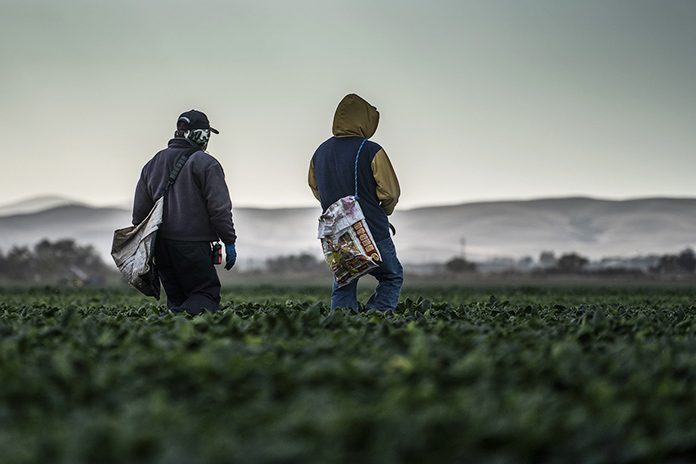A recent report consisting of dozens of interviews with Oregon farmworkers offers a glimpse into the unsafe, unsustainable and often dehumanizing experiences farmworkers have endured during the COVID-19 pandemic.
Oregon State University Professor Ron Mize was one of the authors on the COVID-19 Farmworker Study, part of a long-term, multi-state project examining farmworker living conditions in Washington, Oregon and California.
“Over the years that I’ve taught, I still have to remind people that the way food gets to our table is by people’s hands,” said Mize, whose teaching in OSU’s ethnic studies department includes a course on farmworker justice movements. “It’s hard labor that’s really poorly remunerated that keeps our food prices low, keeps our food plentiful, keeps food on our table; and yet we consistently neglect the reality that farmworkers are fundamental to our food system.”
The researchers performed an initial survey of 300 farmworkers across Oregon from August-September 2020. For the recent report, they conducted in-depth interviews with 48 workers statewide from February-July 2021, and these findings echo what they learned from the earlier survey.
Speaking directly with farmworkers was a priority, the team said.
“The scarce data available about farmworkers too often is disjointed and not collected with the intention of capturing farmworkers in all their complexity and their own voices,” said Jennifer Martinez-Medina, study director and a Ph.D. student at Portland State University. “They are the experts best positioned to describe their lived experiences and the political action required to be treated with dignity.”
During the six-month interview period in 2021, more than half of the subjects tested positive for COVID-19. Lost wages due to the mandatory 10-day quarantine and lack of paid sick leave among farmworkers often forced people to choose between basic necessities like rent, food and their children’s health care.
“That 10 days of quarantine can put you so far behind that you’ll never get back to just the scraping by that you were doing before,” Mize said. “The impacts of the last two years have been cumulative, and they will continue to impact farmworkers.”
With children out of school as classes went remote, women often shifted from being co-breadwinners to stay-at-home caregivers for kids and sick family members, which not only added to their stress and emotional burnout but further reduced families’ incomes, the report found.
Farmworkers who are undocumented face additional challenges. Many still fear that receiving SNAP food benefits or free medical care such as COVID-19 tests and vaccines could get them labeled a “public charge” and render them ineligible to apply for legal residency. That policy was threatened, though never implemented, under the Trump administration, but undocumented workers still avoid seeking public benefits out of fear, Mize said.
Language barriers also affect a wide swath of Oregon’s farmworkers. Employers often rely on employees themselves to translate required health information into Spanish and Indigenous languages like Mam, Nahuatl and Mixteco Alto, with no guarantee that workers actually receive the information, Mize said.
Workers spoke of Occupational Safety and Health Administration inspectors making site visits and observing people close together without masks or other protective equipment, without reporting any safety violations. More than half of the farmworkers interviewed did not feel fully protected in their workplace, and many reported not being informed of COVID infections in their workplaces.
“Too often, the standards for what’s OK for farmworkers are different from what’s OK for everybody else,” Mize said. “OSHA can be held responsible, farms can be held responsible, and we as a collective public can be held responsible.”
The report concludes with a list of recommendations from workers and researchers. Farmworkers want to have more inspectors on farms to perform regular safety and health checks; more widespread vaccination efforts; better provision for the needs of Indigenous communities; better education of employers; and immigration documents so more workers can receive work benefits.
The researchers called for better training, more safety net resources, greater mental health support, and stronger workplace protections and enforcement, among several other recommendations.
“There is no one silver bullet. All these elements have to be addressed together,” Mize said. “I’m hoping our legislative leaders follow that lead, because we can have much more impact on policy when we’re thinking of farmworkers holistically with their whole life, instead of thinking about them as an OSHA inspection or an exposure rate.”
The report was a collaboration among researchers at Oregon State University, Portland State University, the University of Oregon, Oregon Health and Sciences University and the California Institute for Rural Studies, along with more than a dozen community care organizations.











